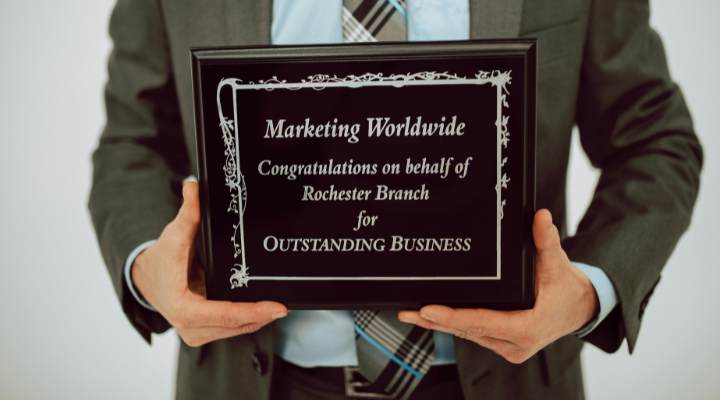Nick Bendel, who heads up the copywriting agency Hunter & Scribe, explains how to write a winning business award submission – as a former judge who’s been there, done that.
Running a small business is hard. But it would be a lot easier if potential clients – and potential referrers – recognised you as a market-leading expert. So how can you achieve that elite status?
One way to make that happen is to collect reviews on Google and other platforms.
Another way is to enter industry awards and local business awards. Winning would be extraordinary; but merely being nominated as a finalist would be remarkable, because it would immediately differentiate you from 99 per cent of your rivals.
Why enter business awards?
First, you don’t have to wait for someone else to nominate you: the overwhelming majority of small businesses that compete for awards have self-nominated.
Second, while awards are competitive, they’re less competitive than you think because relatively few businesses enter – either because they don’t know about the award or they don’t have time to fill in a submission (which is often a hard, time-consuming process) or they assume so many businesses will be entering that they have no chance of success.
Furthermore, most award submissions are poorly written. So if you take the time to write a high-quality submission, you have a reasonable chance of being nominated as a finalist. Let me explain why most award submissions are poorly written, and what you should do to stand out from the pack.
Back up everything you say
Most businesses talk themselves up when writing award submissions, but few provide evidence to back up their claims.
Whenever you make a claim, you have to prove it. For example, it would not be enough to tell judges you did “world-class marketing” last year; you’d also need to provide details of a campaign. By providing the judges with all that information, you’d give yourself the best chance of making them believe that your business had, indeed, done world-class marketing.
Be precise
Many of the businesses that attempt to substantiate their claims fall into the trap of using vague evidence.
This kind of statement doesn’t tell the judges anything: “We invested a significant amount of money into the marketing campaign.”
But this kind of statement does: “We invested $112,000 into the campaign, which was equivalent to 9.6 per cent of our revenue last year, and which was the most money, in both dollar terms and percentage terms, that we’d ever invested in a campaign.”
Stick to the topic
Most people write how they speak – in a disordered way – which is why a lot of award submissions veer off into unnecessary tangents.
If you’re asked to provide an example of an outstanding marketing campaign you did last year, talk about an outstanding marketing campaign – and nothing else.
Start by repeating the question
Many businesses mistake of sticking to a topic – the wrong topic. That’s because they misinterpret the question, and therefore send their argument down the wrong path.
The way to avoid this is to repeat the question in your opening sentence. So you might begin like this: “The best example of outstanding marketing we did last year was a Valentine’s Day promotion in which we invested $112,000 and signed 43 new clients.”
Use fewer words
Don’t waffle on. Judges hate this, because they have a pile of award submissions to read.
If you’re allocated a maximum of 500 words for a question but have only 300 words of value to offer, don’t add 200 words of low-quality information. This kind of waffle not only irritates the judges, it also makes it harder for them to identify the high-quality information.
Final word
When you answer questions for an award submission, your job is not to merely fill in the gaps, as if you were filling in a form at the doctor’s office. Rather, it’s to mount an argument, as if you were appearing in court.
In other words, don’t just give the judges information and hope they use it to reach the right conclusion; give them the information and give them the conclusion at the same time.
That way, you’ll give yourself the best chance of being nominated for an award, and even winning one – thereby positioning yourself as an industry leader.















